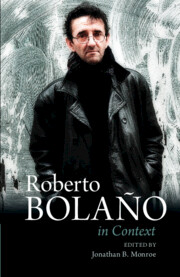Book contents
- Roberto Bolaño in Context
- Roberto Bolaño in Context
- Copyright page
- Contents
- Contributors
- Chronology
- Part I Geographical, Social, and Historical Contexts
- Part II Shaping Events and Literary History
- Part III Genres, Discourses, Media
- Part IV Aesthetics, Culture, and Politics
- Chapter 23 The Abomination of Literature
- Chapter 24 Religion and Politics
- Chapter 25 Gender and Sexuality
- Chapter 26 Race and Ethnicity
- Chapter 27 Trauma and Collective Memory
- Chapter 28 Fictions of the Avant-Gardes
- Chapter 29 Love and Friendship
- Chapter 30 World Literature: Twenty-First-Century Legacies
- Further Reading
- Index
Chapter 24 - Religion and Politics
from Part IV - Aesthetics, Culture, and Politics
Published online by Cambridge University Press: 15 December 2022
- Roberto Bolaño in Context
- Roberto Bolaño in Context
- Copyright page
- Contents
- Contributors
- Chronology
- Part I Geographical, Social, and Historical Contexts
- Part II Shaping Events and Literary History
- Part III Genres, Discourses, Media
- Part IV Aesthetics, Culture, and Politics
- Chapter 23 The Abomination of Literature
- Chapter 24 Religion and Politics
- Chapter 25 Gender and Sexuality
- Chapter 26 Race and Ethnicity
- Chapter 27 Trauma and Collective Memory
- Chapter 28 Fictions of the Avant-Gardes
- Chapter 29 Love and Friendship
- Chapter 30 World Literature: Twenty-First-Century Legacies
- Further Reading
- Index
Summary
Bolaño may justifiably be considered among the least religious writers in the Spanish language, although not necessarily an antireligious one. Simultaneously, his areligious stance made it possible, even necesssary, for him to write works in which links between religion, literature, and Latin American culture are exposed and subjected to scathing critique. His narrative foregoes the use of religion as an artifice, as a “partial magic” to sacralize both the novel and the nation and endow them with a transcendent aura. However, Bolaño’s “romantic anarchism,” with its cynicism about politics and society in general, is counterbalanced by ethics. Bolaño’s reflections on religion and politics explore the worldly aspect of religion and the role of belief and credulity in politics, but also reflect on the dual religiopolitical aspect of literature itself, which is made particularly visible in and by the profession of literary criticism. In our postmodern age, Bolaño suggests, even as art and religion merge in their discourses, there is a further merger of both art and religion with politics. Contemporary art (including literature, of course) is for Bolaño a potentially perverse fusion of religion’s invocation of belief, politics’s thirst for power, and art’s own inherent powers of deceit and manipulation.
- Type
- Chapter
- Information
- Roberto Bolaño In Context , pp. 275 - 284Publisher: Cambridge University PressPrint publication year: 2023



